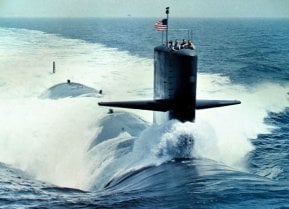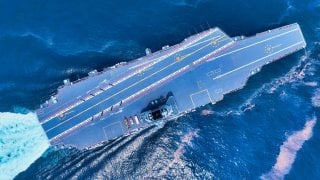China Isn't Giving Up on the South China Sea
Once upon a time, China went out of its way to allay anxieties roused by its power and ambition. Then it stopped. Its new charm offensive would prove likewise perishable, to be scrapped once the party felt at liberty to resume its campaign for sovereignty within the nine-dashed line.
So I’ve been reading psychologist Philip Tetlock’s treatise on Expert Political Judgment. It’s a nifty piece of work, well worth your time. Recommended! Except for one pervasive twitch: Tetlock demands receipts. He badgers political commentators to go on record predicting the future, complete with percentages indicating how confidently they’re prophesying on this or that event or trend. And he wants them to comment on a wide variety of events and trends. The author wants to grade experts to find out who commands the right stuff as prognosticators. And he’s wroth with those who take a humbler approach to their trade—declining, with baseball philosopher Yogi Berra, to hold forth too glibly on what the future portends.
Including yours truly, I suppose. Tetlock takes issue with “radical skeptics” who deny the possibility of accurate, quantifiable foresight. Guilty as charged. But also prudent. After all, skepticism is the soul of the scientific mindset. The best any of us can do is gaze through a glass darkly in hopes of glimpsing the rough contours of what’s to come. It’s hard enough to predict future outcomes even in the world of science, governed as it is by laws of nature that purport to make scientific inquiry orderly, replicable, and reproducible by contrast with the hurly-burly of human affairs. The world of politics is a world of complexity—of countless ill-defined variables that interact in unforeseeable ways.
No one can know the precise value to assign each variable at work in the political world. Change one or more variables and you deflect the coming sequence of events. The future ricochets off onto a different tangent than the keenest seer could have predicted. That’s what happens when one event depends on the event that came before and shapes the one that lies ahead.
Moreover, competitive affairs unfurl in a realm of clashing wills where competitors try to thwart one another, imposing their will on unwilling opponents for strategic and political gain. They have every incentive to act unpredictably in hopes of ruining their opponents’ schemes and getting their way. In short, competitive interaction is an inherently, deliberately complex domain befogged by chance, uncertainty, and intractable willpower, along with dark passions such as rage and spite. Just ask Carl von Clausewitz, a fellow radical skeptic. The Prussian soldier-sage denounced past efforts to reduce warlike endeavors to rules and formulas:
“Efforts were therefore made to equip the conduct of war with principles, rules, or even systems[, but] people failed to take adequate account of the endless complexities involved. As we have seen, the conduct of war branches out in almost all directions and has no definite limits; while any system, any model, has the finite nature of a synthesis.”
This is a telling statement from Clausewitz, who ranks among the forefathers of complexity theory. He catalogs the bewildering array of variables besetting field generals before concluding that only a “military genius”—a Napoleon, or a Frederick the Great—possesses the “inward eye,” or intuition, necessary to peer through the fog of war and discern the best course of action. For authority Clausewitz invokes Napoleon Bonaparte, the French god of war during his lifetime, along with the greats of mathematics. He continues:
“Circumstances vary so enormously in war, and are so indefinable, that a vast array of factors has to be appreciated—mostly in the light of probabilities alone. The man responsible for evaluating the whole must bring to his task the quality of intuition that perceives the truth at every point. Otherwise a chaos of opinions and considerations would arise, and fatally entangle judgment. Bonaparte rightly said in this connection that many of the decisions faced by the commander-in-chief resemble mathematical problems worthy of the gifts of a Newton or an Euler.”
And even a genius at arms like the little emperor might falter before such a herculean task. Napoleon met his Waterloo, after all. Geniuses are few and far between, and they’re fallible like the rest of us. In wartime, in fact, they have to “guess” at their foes’ characteristics and likely reactions to martial stimuli. Clausewitz insists that the commander must:
“. . . guess, so to speak: guess whether the first shock of battle will steel the enemy’s resolve and stiffen his resistance, or whether, like a Bologna flask, it will shatter as soon as its surface is scratched; guess the extent of debilitation and paralysis that the drying up of particular sources of supply and the severing of certain lines of communication will cause in the enemy; guess whether the burning pain of the injury he has been dealt will make the enemy collapse with exhaustion or, like a wounded bull, arouse his rage; guess whether the other powers will be frightened or indignant, and whether and which political alliances will be dissolved or formed.”
Guesswork abounds. All of that being said, the world—like a kaleidoscope—resolves into a clear image once in awhile. On such occasions I might venture a prophecy about something I know well. Here are a few from over the years. Yes, China can build a navy of serious heft. (Believe it or not, that was a minority view not that many years ago.) Continental powers have done it before, and given predominant maritime powers fits. Yes, China can field implements needed to carry out an ambitious maritime strategy, such as antiship ballistic missiles and high-tech surface combatants. (Well-known China hands used to deny it.) No, there is no reason to think China will abandon its seaward quest once it settles the Taiwan question to its satisfaction. Chinese sea power is far more likely to go global—witness its forays into the Indian Ocean region and beyond.
And here’s a prediction from just this past week: Beijing will never consent to a code of conduct forever relinquishing its claims to “indisputable sovereignty”—in effect state ownership—of waters, landmasses, and skies within the nine- or ten-dashed line it has inscribed on the map of the South China Sea. By all means, Southeast Asian leaders such as Philippine president Ferdinand Marcos Jr. should keep prodding Chinese Communist Party potentates to accede to such a pact, as Marcos did during a meeting between ASEAN and Chinese premier Li Qiang last week. But not with any real expectation that Beijing will assent to such a pact or abide by it if it does. The true value of a diplomatic offensive is to keep China on the defensive, reminding everyone what a lawless great power it is.
Think about it. China long ago agreed to a code of conduct in the South China Sea, not to mention every other body of water on planet Earth. Namely the UN Convention on the Law of the Sea. The convention delineates coastal states’ sovereign rights and privileges in offshore seaways—and explicitly proscribes claims of the kind China has lodged and has sought to enforce. If Beijing is prepared to disregard the law of the sea, known as the constitution for the world’s oceans and seas, why would anyone think the Communist Party leadership would let a nonbinding scrap of paper like a code of conduct abridge its strategic and political goals?
It wouldn’t.
Moreover, it couldn’t. Think about the predicament Xi Jinping & Co. have put themselves in, apparently by design. By making extravagant promises loudly and often, they have put themselves in a position where they cannot compromise one whit on China’s maritime claims lest they look feeble and feckless in the eyes of the Chinese people, their chief constituency. They have connected China’s territorial claims to sovereignty, vowing to recover every inch of geographic space once ruled by China during its dynastic age. Sovereignty is a powerful word for societies that were once the playthings of empires. They have linked their claims to the crusade to banish memories of the nation’s “century of humiliation” at the hands of seaborne conquerors. They have made wresting back ground the core of Xi’s “China Dream” of national rejuvenation. These themes resonate. Xi has pledged to make good on them, he has done so repeatedly, and he has done so in the most impassioned terms.
Now the general secretary must deliver. Looking weak or irresolute before your constituents is hazardous for any practitioner of statecraft, but especially for political leaders of an authoritarian state like China. That’s why despots go to such lengths to burnish their images for prowess and squelch dissent. And to Xi’s credit, he has not put himself on a fixed deadline to accomplish these goals. It seems to have become entrenched wisdom in Washington DC that Beijing will move against Taiwan militarily in 2027, when in fact Xi has merely instructed the People’s Liberation Army to furnish him with a military option by that year. Political leaders like to have options. If there is a fixed deadline to fulfill the China Dream, it seems to be 2049, the centennial of the founding of the People’s Republic.


